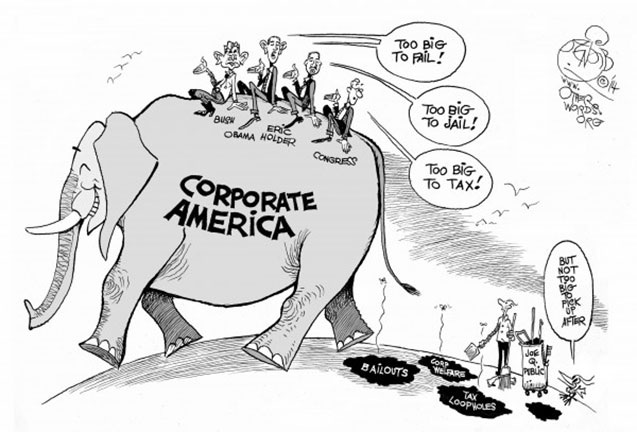
Did you know that Truthout is a nonprofit and independently funded by readers like you? If you value what we do, please support our work with a donation.
Wouldn’t it be nice if the government paid you on Tax Day? I’m not referring to getting a tax refund because you overpaid the federal government or a safety-net benefit labeled as a tax refund under the “Earned Income Tax Credit” rules.
I mean an actual payment from the U.S. Treasury.
 When Corporate America Gets Too Big to Tax, an OtherWords Cartoon by Khalil Bendib
When Corporate America Gets Too Big to Tax, an OtherWords Cartoon by Khalil Bendib
Done laughing? Great. This really could happen, but with corporate-tax bills, not your personal 1040. Yes, we may very well see the day when Uncle Sam spends more money pandering to big companies than it receives from taxing them.
In the past half-century, corporate tax dollars have plunged as a percentage of the economy and as a share of total federal revenue. The effective corporate tax rate is less than half of what it was just a few decades ago and now hovers at 12.6 percent, roughly one-third of the official 35 percent rate.
Calls to slash the corporate tax rate, or even scrap this tax altogether, span the political spectrum. Proponents justify this on the basis of “tax competition,” the battle among nations to attract giant corporations or discourage their departure.
The term “tax competition” is a euphemism for a race to the bottom among nations in both the developed and developing world. Each country slashes its corporate income tax rate in an attempt to lure multinational corporations to base their operations there, or at least dissuade corporations already based there from relocating.
The idea behind reducing or eliminating the U.S. corporate income tax, then, is simply a tactic to win the race to the bottom. Reduce the corporate income tax rate in the United States, or drop this tax altogether, and the exodus of multinational corporations from America will stop and even flip. If we shrink the corporate income tax rate to zero, the logic goes, no country can outbid us.
Or can they?
If America is willing to reduce its corporate income tax rate to zero, why can’t another country move to a negative corporate tax rate that outright pays corporations to set up shop? Why are zero-corporate-tax proponents certain that the maximum bribe a country would offer to a multinational corporation is a zero tax rate?
Say, for example, after our government reduced its corporate tax rate to zero, Canada sought to lure a Minnesota-based outfit across the border. Could the Canadian government up the ante by offering that corporation a share of the income taxes paid by Canadians employed by it after its relocation? Or could the Canadian government simply offer the corporation a direct subsidy for relocating?
The race to the bottom that states have run for years makes the answer to those questions a resounding yes. By engaging in “tax competition,” state governments have decimated their tax bases.
Not only have Arizona, Indiana, North Carolina, and other states slashed tax rates for corporations, they’ve engaged in massive giveaways in a futile attempt to lure businesses to cross domestic borders. They and their political subdivisions have agreed to property-tax exemptions, job-training subsidies, low-rate municipal bond financing, and dedicated infrastructure spending.
They even have agreed to pay to corporations a portion of the income tax revenue they receive from employees of those corporations. According to the organization Good Jobs First, our states collectively fork over about $700 million each year in state income tax revenue to corporate America.
The premise behind proposals to pare or kill the corporate income tax is preposterous. Other countries can move to a negative tax rate just as quickly as we can move to zero.
And when other countries move to a negative tax rate for corporations, who will stop Uncle Sam from following them?
There is an alternative: tax diplomacy. A new treaty could stop multinationals from pitting governments against one another in a never-ending hollowing-out of the global tax base.
Otherwise, we may just find ourselves taking the tax dollars we pay as individuals, which should be used to build schools, roads, and bridges, and handing them over to corporations on Tax Day instead.
Trump is silencing political dissent. We appeal for your support.
Progressive nonprofits are the latest target caught in Trump’s crosshairs. With the aim of eliminating political opposition, Trump and his sycophants are working to curb government funding, constrain private foundations, and even cut tax-exempt status from organizations he dislikes.
We’re concerned, because Truthout is not immune to such bad-faith attacks.
We can only resist Trump’s attacks by cultivating a strong base of support. The right-wing mediasphere is funded comfortably by billionaire owners and venture capitalist philanthropists. At Truthout, we have you.
Truthout has launched a fundraiser, and we have only 24 hours left to raise $17,000. Please take a meaningful action in the fight against authoritarianism: make a one-time or monthly donation to Truthout. If you have the means, please dig deep.